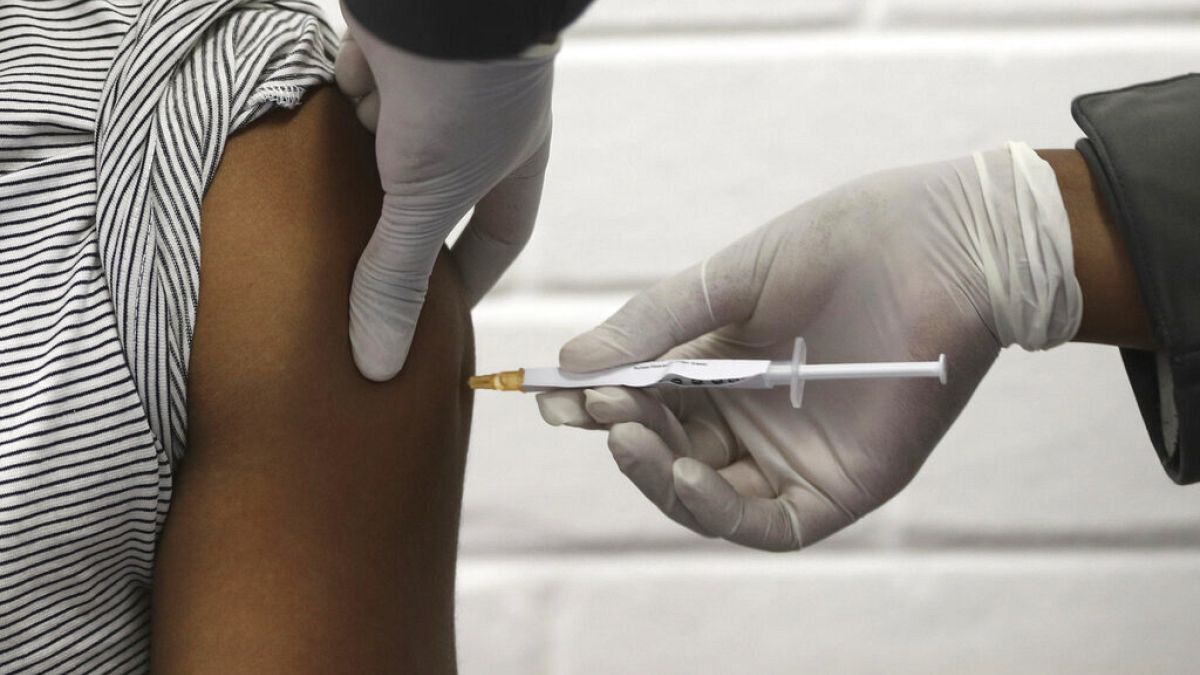With scientists racing to develop a COVID-19 vaccine, leaders face the unprecedented challenge of manufacturing and distributing a vaccine worldwide. Euronews will speak to some of the world's leading experts to find out what hurdles we face and what solutions can be found.
In the frantic scramble to develop a COVID-19 vaccine to put an end to the global pandemic, the race has laid bare nationalistic tendencies and brutally exposed the inequity underpinning access to health.
Even before a vaccine has been officially approved, billions of doses of candidate vaccines have been snapped up by high-income countries.
There are an estimated two billion doses pre-ordered, with a high proportion of those set for the US, UK and EU.
One of the key issues, experts told Euronews, will be building public confidence and encouraging global cooperation on distributing a vaccine.
Euronews’ Isabelle Kumar moderated an online discussion in partnership with the World Economic Forum on the challenges, pitfalls and solutions to ensure a safe, effective and globally accessible vaccine is made available.
Tune in here to watch the discussion live from 18:30-19:15 CET on September 24.
Equitable access to a vaccine
Donald Trump claims a vaccine could be available for the US by election day while Vladimir Putin last month declared that Sputnik 5, tested on his own daughter, had already been approved.
But the truth, according to many experts, is that vaccine won't come online until at least Spring 2021 and developing a vaccine is only the first hurdle.
For the inoculation to be effective, experts agree, it will have to be distributed globally to rich and poor. The World Health Organisation (WHO) has warned that hoarding the vaccine could make the pandemic last longer.
Experts said during the World Economic Forum moderated by Kumar that creating trust among the population would be key to distributing a vaccine.
Heidi Larson at the London School of Hygiene & Tropical Medicine said that there were important lessons learned during Ebola.
She emphasised that experts needed to have "empathy" for individuals who might be unsure about a vaccine and work on building confidence.
"We can get in there and start communicating and engaging," she said.
Some of those challenges include logistical distribution -- what temperature the vaccine will need to be stored at and whether the resources are in place to ship them, explained Sai Prasad at the Developing Countries Vaccine Manufacturers Network.
"We are still working through that as we go and we haven’t solved all of the challenges yet but we are beginning to identify them," said Richard Hackett, Chief Executive Officer of the Coalition for Epidemic Preparedness and Innovations.
Watch the opening remarks from Klaus Schwab, Executive Chairman of the World Economic Forum in the player below.
Global distribution plan
Amid the COVID gloom, there is tentative cause for hope that most vulnerable will have access to the vaccine.
On Monday, the WHO unveiled a global plan to distribute a future vaccine fairly. So far, the COVAX initiative has received commitments from nearly two-thirds of the global population to ensure the equitable access of a future jab.
The WHO is working alongside Coalition for Epidemic Preparedness and Innovations (CEPI) and GAVI, the vaccine alliance.
“COVAX is now in business”, said Gavi CEO Seth Berkley. “Governments from every continent have chosen to work together, not only to secure vaccines for their own populations, but also to help ensure that vaccines are available to the most vulnerable everywhere”.
The European Commission has signed up, though in a worrying sign, so far, the US and China have not and billions of dollars are still needed to get the inoculations, once ready, up and running.
But Julie Gerberding, executive Vice President of Merck, said that many private companies were working with COVAX and scientists in both the US and China were part of the international effort.
Merck is also working on antivirals in the hopes of reducing the mortality of the disease.
"The next three or four months are crucial," said Prasad, adding that typically vaccines take decades to develop.
Berkley pointed out that hopefully, lessons were learned from the COVID-19 pandemic, and the trillions that it has cost the world will help better prepare countries for future epidemics.
Kumar was joined in the WEF discussion with:
Richard Hatchett, Chief Executive Officer, Coalition for Epidemic Preparedness and Innovations (CEPI), Norway
Seth F. Berkley, Chief Executive Officer, Gavi, the Vaccine Alliance, Geneva
Sai Prasad, President, Developing Countries Vaccine Manufacturers Network (DCVMN)
Julie Gerberding, Executive Vice-President and Chief Patient Officer, Strategic Communications, Global Public Policy and Population Health, MSD, USA
Heidi Larson, Professor of Anthropology, Risk and Decision Science at the London School of Hygiene & Tropical Medicine and Director of The Vaccine Confidence Project


